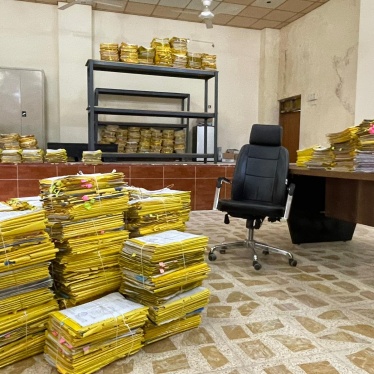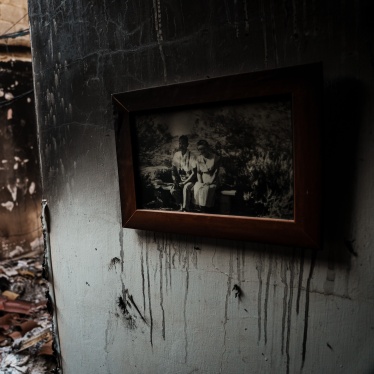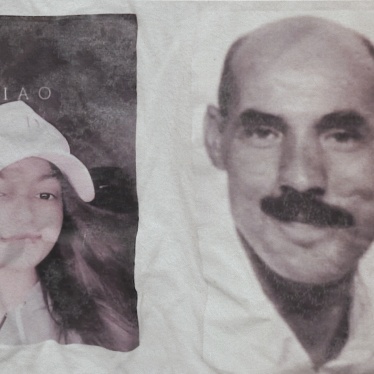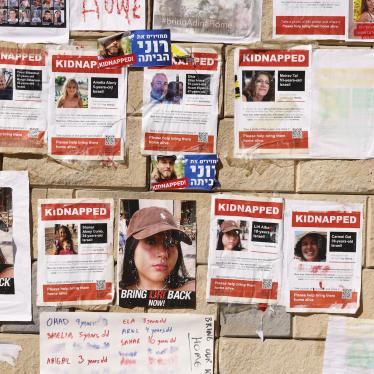Six international human rights organizations said today that a new draft law regulating non-governmental organizations in Egypt, passed on 27 May 1999 by the Egyptian Parliament, imposes restrictive conditions on civil society institutions in violation of international law
A new draft law regulating non-governmental organizations in Egypt, passed on 27 May 1999 by the Egyptian Parliament, imposes restrictive conditions on civil society institutions in violation of international law, the above six international human rights organizations said today.
The draft law restricts the right of freedom to association as guaranteed under the International Covenant on Civil and Political Rights (ICCPR). It is a cause for serious concern that it provides a set of criminal penalties, including a maximum sentence of one year in prison, for offenses that might amount to no more than the exercise of freedom of association," the six groups said.
The text, which has yet to be ratified by the Egyptian president, would give the authorities far-reaching controls over non-governmental organizations' (NGO) activities, including the work of Egyptian human rights groups.
The draft provisions impose a wide range of restrictive conditions on the management, operations and financing of NGOs and will allow authorities to control relations at the international level, activities at local level, funding from abroad and composition of boards of directors. Under the new law, NGOs will be required to receive prior approval from the authorities in order to join or affiliate with an organization abroad, and violators will face up to three months imprisonment. Other violations of the law, such as activities that "threaten the national unity," bring prison sentences of up to one year .
This draft law is flagrantly at odds with the letter and spirit of the UN Human Rights Defenders Declaration. The Declaration, adopted by the General Assembly in December 1998, recognizes the rights and responsibilities of human rights defenders and requires governments to create an environment in which they can work without interference and harassment.
Over the past 18 months, Egypt's human rights community has campaigned against restrictive measures in various drafts of the law, and also provided advice and expertise during the government's protracted drafting process. However, human rights activists and other NGOs have vigorously complained that their recommendations and reservations have been ignored by the authorities.
Amnesty International, Human Rights Watch, the International Federation of Human Rights (FIDH), Lawyers Committee for Human Rights (LCHR), the Observatory for the Protection of Human Rights Defenders and the World Organization Against Torture (OMCT) appeal to the Egyptian President:
not to ratify the draft law;
to refer the draft back to Parliament for revision and to encourage parliamentarians to undertake a full and open discussion of the law's controversial provisions;
to ensure that legal provisions regulating NGOs will contribute to improve the framework for human rights work in conformity with international standards and not impose or maintain restrictive conditions.
Background
The proposed new Law on Civil Associations and Institutions would replace the existing Law 32 of 1964 regulating NGOs in Egypt. However, under Law 32 of 1964 human rights organizations, in particular, have faced difficulties in obtaining registration. For example, the Egyptian Organization for Human Rights has continued to operate "in formation" since it was founded in 1985. Other human rights activists have resorted to founding non-profit companies as a legal umbrella for their activities. The new law requires existing institutions to register within six months of the new regulations coming into force.
Under the new law, NGOs must receive prior approval by the authorities for several activities, including conducting board elections (Article 34) and joining an organization outside Egypt (Art 16). Board members face up to three months imprisonment if they arrange for an NGO to join an organization abroad without prior permission (Article 75). If an NGO fails to seek permission before joining an organization abroad, the authorities can initiate the dissolution of that NGO under procedures laid down in Article 42. Imprisonment for up to six months is prescribed for any member of an NGO receiving or sending money abroad or collection of donations without prior permission from the authorities (Article 75).
The engagement in "any political or unionist activities restricted to political parties, trade unions and professional associations (niqabat)" is prohibited and can lead to imprisonment of up to one year (Article 11, Article 75). Under such vague provisions, NGO activities, in particular in the field of civil rights, can be banned or might even lead to imprisonment.
On 9 December 1998, the UN General Assembly adopted the "Declaration on the Right and Responsibility of Individuals, Groups and Organs of Society to Promote and Protect Universally Recognized Human Rights and Fundamental Freedoms" -- commonly referred to as the "Human Rights Defenders Declaration." The Ministerial Conference on Human Rights, held by the Organization of African Unity in Mauritius in April 1999, urged African governments to take appropriate steps to implement the Declaration.
Article 5 of the Declaration states: "For the purpose of promoting and protecting human rights and fundamental freedoms, everyone has the right, individually and in association with others, at the national and international levels:
(a) To meet or assemble peacefully;
(b) To form, join and participate in non-governmental organizations or groups;
(c) to communicate with non-governmental or intergovernmental organizations."
Article 22 (1) of the ICCPR states: "Everyone shall have the right to freedom of association with others, including to form and join trade unions for the protection of his interest."
Following the UN Human Rights Committee's last examination of Egypt concerning the implementation of the ICCPR in 1993, the Committee recommended that "the Egyptian authorities should establish a closer and constructive dialogue with non-governmental organizations active in the field of human rights."





